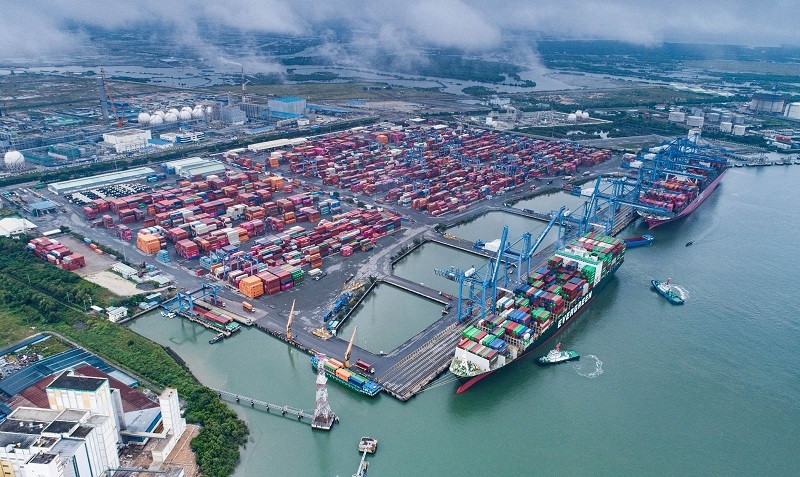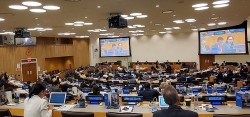
The significance of the 1982 UN Convention on the Law of the Sea for the protection of Vietnamese rights and interests in the East Sea (Part 2)
Latest
 |
| Vietnam has advantages in marine economy. (Source: baobariavungtau) |
The Law on Vietnamese Seas 2012 takes effect from 01/01/2013. On the basis of UNCLOS and the Law on Vietnamese Seas 2012, Vietnam promulgated and amended a series of specialized laws such as the 1980 Maritime Code amended in 2005 and 2015; the 1993 Petroleum Law, revised in 2000, 2008 2014 and in 2022; the 1993 Law on Environmental Protection, amended in 2014 and 2020; the 2015 Criminal Code, the 2015 Law on Marine and Island Resources and Environment; the 2003 Fisheries Law, amended in 2017; the 2018 Law on the Vietnam Coast Guard; and the 2009 Law on Militia and Self-Defense Forces, amended 2019 and dozens of related legal documents.
Vietnam has also signed a total of 11 conventions of the International Maritime Organization, including the Convention for the Safety of Life at Sea (SOLAS), Convention for the Prevention of Pollution from Ships (MARPOL), Convention on Civil Liability for Oil Pollution Damage (CLC), Convention on Facilitation of Maritime Traffic (FAL), and Convention on Maritime Search and Rescue (SAR).
UNCLOS provides the basis for Vietnam to develop and implement Vietnam's maritime strategy to 2020 (Resolution No. 09-NQ/TW) and Vietnam's strategy for sustainable development of the marine economy to 2030, vision to 2045 (Resolution No. 36-NQ/TW) with general goals of turning Vietnam into a powerful maritime nation with sustainable development, prosperity, security and safety; the marine economy makes an important contribution to the national economy, contributing to building our country into a modern industrial country with socialist orientation; participate actively and responsibly in solving international and regional issues on seas and oceans. On the basis of this strategy, the Marine Spatial Plan for the protection and construction of the Motherland in the new situation has been adopted in 2023.
UNCLOS also sets requirements for Vietnam to reform the management apparatus and strengthen its maritime law enforcement forces. Vietnam was the first country in the region to build a coast guard force in 1998. Through the promulgation of the two ordinances in 1998 and 2008 and the law on the coast guard in 2018, this force has become strong enough to reach out to enforce the law in all maritime zones including the Exclusive Economic Zone and Continental Shelf of Vietnam and extension of international cooperation.
In addition to the Coast Guard, Vietnam has restored the fisheries surveillance force and maritime self-defense forces to assist the Navy and the Coast Guard in defending the country’s maritime sovereignty, sovereign rights and jurisdiction.
| More from WVR |
 The significance of the 1982 UN Convention on the Law of the Sea for the protection of Vietnamese rights and interests in the East Sea (Part 1) The significance of the 1982 UN Convention on the Law of the Sea for the protection of Vietnamese rights and interests in the East Sea (Part 1) |
UNCLOS has expanded Vietnam's maritime rights and interests beyond the limits of the East Sea. As a party to the 1994 Agreement, Vietnam has the right to register plots for the exploration and exploitation in Area – the heritage of Humankind. Joining UNSFA-1995 and BBNJ allows Viet Nam to share benefits in management of marine genetic resources, marine protected areas or Straddling Fish Stocks and Highly Migratory Fish Stocks across the oceans.
Vietnam not only has rights but also responsibilities for ocean plastic waste management, combating illegal, unregulated and unreported (IUU) fishing violations preventing sea level rise or adapting to climate change.
Through 30 years of implementation, UNCLOS has provided a comprehensive legal framework for the peaceful, cooperative and sustainable utilization of seas, oceans and marine resources. The Convention asserts that the issues of the seas and oceans are closely interrelated and must be addressed as a whole.
The effective and comprehensive implementation of the provisions of the Convention will help humankind to address current challenges to build a green, peaceful and prosperous planet. The Convention serves as an indispensable legal tool for developing countries, including Vietnam, in the struggle for a fair maritime legal order and sustainable development.









